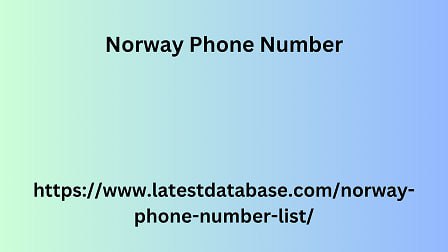Post by account_disabled on Feb 28, 2024 4:33:53 GMT
If the question of targeting one's brand is compared to the obverse of a coin, then the reverse will be the question: "Should we target competitors' brands?". After all, this is their "precious semantics", not yours. Here it is worth talking about the peculiarities of buying an apartment. It all starts with the fact that a person looks for information on blogs and forums about which residential complexes of the appropriate class (economy, comfort, business, elite) are located in comfortable areas of the city for him. The user has not yet decided to whom he is ready to go to view the object, and you have an excellent opportunity to bring this user to your landing page.
I will give an analogy with the exhibition. The number of people here is limited. Therefore, you decide to meet the user already at the entrance Norway Phone Number and offer go right to your stand. Logically, it's the people (think search users) who came up with the idea (search query) to visit your stand (landing page) will easily succumb to your persuasions and will follow you At the same time, there may be far fewer people who planned to visit a competitor's stand compliant (low CTR), and therefore much more effort will have to be made to attract them (high price per click). But, when there are not so many people, and you want sales, then you will go for it. In addition, users entering brand queries (whether yours or competitors) are divided into two types: Those who purposefully want to get to the brand's website and make a conversion.

Those who have not yet been to the site, but want to familiarize themselves with important information (infrastructure, location) and later, after comparing with other offers, make a decision about the application. Subscribe to the hot ones MARKETING NEWS MARKETOLOGIST 2.0 > Subscribe to the monthly NEWS DIGEST Enter your E-mail You won't be able to accurately separate type a from type b in your competitors' requests. But definitely try to get type b on the site, because the probability of conversion is acceptable. But this statement is correct, if you really target your competitors, and not just all housing complexes in Kyiv of a similar price segment. Importantly! Target keywords for objects that are in direct competition. Keys from those competitors who are less close to you, but you would also like to check them in advertising, should be placed in separate ad groups or campaigns.
I will give an analogy with the exhibition. The number of people here is limited. Therefore, you decide to meet the user already at the entrance Norway Phone Number and offer go right to your stand. Logically, it's the people (think search users) who came up with the idea (search query) to visit your stand (landing page) will easily succumb to your persuasions and will follow you At the same time, there may be far fewer people who planned to visit a competitor's stand compliant (low CTR), and therefore much more effort will have to be made to attract them (high price per click). But, when there are not so many people, and you want sales, then you will go for it. In addition, users entering brand queries (whether yours or competitors) are divided into two types: Those who purposefully want to get to the brand's website and make a conversion.

Those who have not yet been to the site, but want to familiarize themselves with important information (infrastructure, location) and later, after comparing with other offers, make a decision about the application. Subscribe to the hot ones MARKETING NEWS MARKETOLOGIST 2.0 > Subscribe to the monthly NEWS DIGEST Enter your E-mail You won't be able to accurately separate type a from type b in your competitors' requests. But definitely try to get type b on the site, because the probability of conversion is acceptable. But this statement is correct, if you really target your competitors, and not just all housing complexes in Kyiv of a similar price segment. Importantly! Target keywords for objects that are in direct competition. Keys from those competitors who are less close to you, but you would also like to check them in advertising, should be placed in separate ad groups or campaigns.
